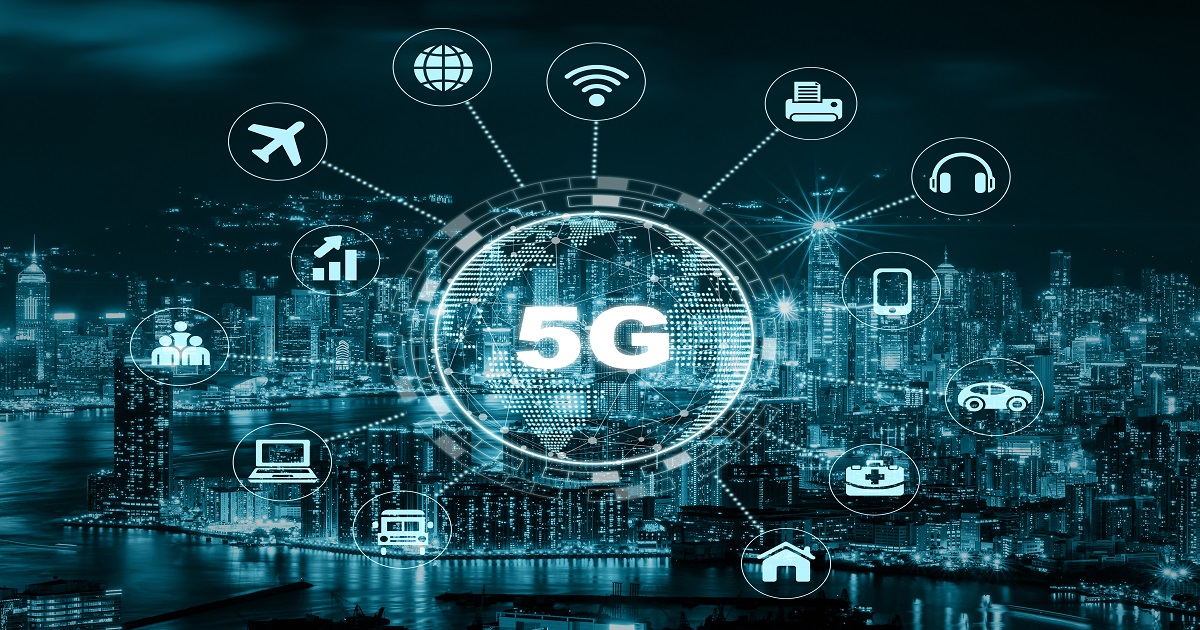
As stated by Gartner, digitalization refers to using digital technologies to change a business model and provide new revenue and value-producing opportunities, and in business, this has proven to be almost essential for business success nowadays. A variety of technological innovations are rapidly reshaping the landscape of a variety of industries, and none more so than the introduction of 5G.
5G is expected to greatly change the way businesses work and the way people live, being faster and able to handle more connected devices than the existing 4G LTE network, with improvements that will enable a wave of new kinds of tech products. The new network offers high data rates (1-20 Gbit/s), ultra-low latency (1 ms), high security, reliability, and scalability, all of which will help fuel transformative new technologies, not just for consumers but also for businesses, infrastructure and defense applications.
While 5G networks began rolling out in the United States and around the world in 2018, the tech is still in its early days, but the recent surge in growth is quickly making 5G common in many industries. The global 5G services market size was valued at USD 47.3 billion in 2021 and is expected to expand at a whopping compound annual growth rate (CAGR) of 52.0 percent from 2022 to 2030.
“Along with the general growth of 5G, private 5G networks are becoming increasingly popular among enterprises,” said Roy Timor-Rousso, Chief Revenue Officer at Pente Networks, an Enterprise 5G provider of IT-friendly private networks that challenge the way the industry thinks about wireless private networking. “Private 5G refers to a mobile network that is technically the same as a public 5G network but which allows the owner to provide priority access or licensing for its wireless spectrum. Some aspects of private 5G are identical to the public 5G networks, but the key differences between the two relate to priority access and isolation, and for the first time ever, fully software designed and delivered operating systems are available directly to enterprises, managed service providers, system integrators, independent software vendors and more. This is game-changing.”
The adoption of private 5G networks is gaining traction around the world as regulators allocate more spectrum to enterprises so they can build and maintain their own private 5G networks. The global private 5G network market size is estimated to reach USD 14.28 billion by 2028, registering a CAGR of 39.7 percent between now and then – astounding but understandable growth. In the US, the availability of unlicensed spectrum, including CBRS, is changing the economics as CBRS is virtually free.
According to The Adoption of Private Networks for Enterprises, a report published by Capgemini, a French multinational information technology services and consulting company, the rapid growth of private 5G networks can be attributed to three things: the value of digitization and automation of a multitude of industries, the current demand by businesses and consumers for flexible communication networks, and the urgent need to modernize the legacy Land Mobile Radio System (LMRS).
“Designed for a person to person communication in a variety of deployment scenarios such as portable (handheld walkie-talkies), mobile (installed in vehicles) and stationary (e.g., base station units),” is how Capgemini further defines LMRS systems, “which are used in the public domain, including public safety (Police, Fire, Ambulance) utilities (Airports, Ports, Logistics) or in the private domain for specific use cases (Taxis, delivery services) natural resources (Oil & Gas or Mining). The erstwhile LMRS systems lack broadband capabilities with limited communication potential or multi-media capabilities and need revamping.”
“These three factors are driving the rise of private 5G networks,” Timor-Rousso explained. “There are key differences between public and private 5G networks, including the advantages private 5G can offer in flexibility and control, including security, not just speed. Private 5G operating systems, like our HyperCore mobile core technology, enable enterprises, government agencies, universities, and more to prioritize traffic for their own business use cases with an agility they could never achieve with wired networks or the unmanaged Internet.”
Apart from flexibility and control, private 5G can also offer more benefits in reach and mobility than public networks.
“Wireless coverage tailor-made for business needs minimum or no coverage holes even in difficult or remote geographies. The number of access points required could be a fraction of those needed in Wi-Fi, resulting in significant savings in initial deployment costs,” the report states. “While mobility allows connectivity to move assets, Automatic Guided Vehicle (AGV) – handover between Wi-Fi AP is a major concern for AGV use cases and solved with private wireless 5G use cases.”
“Private 5G networks are on a completely different level than the Wi-Fi networks organizations have been using for decades,” Timor-Rousso said. “The performance and reliability of Wi-Fi are not enough anymore, especially for industrial use cases which require extra security and which need to work in often unforgiving environments. This spurs innovation as well, for example, the use of digital twins, augmented and virtual reality, robotic process automation, autonomous systems on factory floors, and so much more. A combination of VR/AR and connectivity to facilitate remote expert support to people operating and maintaining the equipment, applications, and wearables to inform the shift leaders of any significant issue in their area of responsibility is a very popular use case. Private 5G works inside and out.”
The Capgemini report also cites that digital simulations and predictive analysis of production processes, labs, factories, or entire networks made capable by private 5G can allow companies to steer processes proactively.
“Use of advanced stochastic simulation techniques to model the behavior of the factory and predict performance in changing environments, such as new product being introduced, new equipment, change in product mix and increase or decrease in volumes, or use of analytics to understand the performance of individual processes depending on the process parameters and then be able to predict the result of the production,” says the report. “By analyzing the behavior of individual components in machines and predicting when they should be replaced to avoid degraded quality or machine shutdown.”
Private 5G networks can also offer benefits in the energy and utilities sector, which would not only benefit the companies but the consumers as well.
“By using a private 5G network, the control, optimization, and end-to-end data ownership resides with the utility and will also provide a communications network that supports the utility’s specific applications,” Timor-Rousso explained. “These multi-service platforms can include operational, machine-to-machine IoT applications while also supporting real-time communications applications. Organizations can logically separate virtual networks to support physical security and voice and data communications. And – very importantly – managed service providers can monetize their investment in setting up private 5G networking using a Neutral Host approach. Utility companies, for example, and become wireless 5G service providers overnight and sell to different businesses and smart home consumers.”
A defined quality of service policy specific to each application can be deployed, Timor-Rousso said, as customizing the bandwidth allocation ensures that when critical data is required, the communications network won’t throttle throughput.
The benefits and the use cases of private 5G networks are bountiful, which almost makes one wonder why the growth numbers aren’t larger than they were. According to the Capgemini report, the reason for that could be the expansive ecosystem of partners a business needs to deploy a 5G network correctly.
“As demonstrated by experts, it is essential to build a robust ecosystem approach to harness the power of private networks in Industrial scenarios,” the report says. “The key motivation is the production efficiency or process efficiency that can permit cost gains for manufacturing. The environment of success for private networks delivering the business goals of an enterprise comprises multiple players.”
The report named telco operators, the core IP, process and operation experts, and a system integrator as the essential components of private 5G network deployment. Each one of these players has to offer the expertise in their field to successfully set up a functioning private 5G network that one can benefit off of.
“Overall, private 5G networks have developed significantly as a response to flourishing use cases of connectivity across a variety of sectors,” Timor-Rousso concluded. “And although large deployments have some up-front Capex, the ROI for enterprise private 5G makes the transformation well worth it. As we venture further into a new digital era, the spread, adoption, and use of 5G around the world continue, more private 5G networks will appear for the benefit of consumers and whole industries alike.”
Edited by
Maurice Nagle





